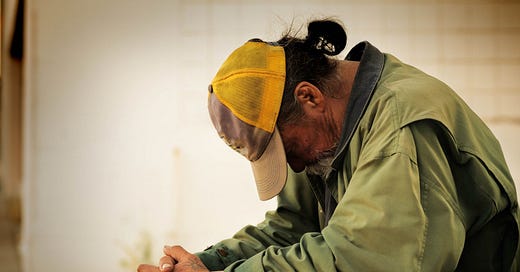Social programs should not be about making the poor more comfortable
We should be promoting their Upward Mobility
In previous articles in this series, I argued that Equality of Outcome is an impossible dream, and attempts to create it do great damage to society. In another article, I argued that Equality of Opportunity is not enough. Youth, particularly those from low-income families typically copy the behavior of those around them, even if those behaviors lead to dysfunctional outcomes. While low-income youths should be copying the successful, far too often they copy the least successful.
Equality of Outcome and Equality of Opportunity are not the only potential goals for the American welfare state. In this article, I assess the validity of some other potential goals:
Making the poor and near-poor comfortable despite their poverty
Stabilizing society
See more articles on Upward Mobility:
I also will be writing a significant number of excerpts from my forthcoming book: Upward Mobility: A Radical New Agenda to Uplift the Poor and Working Class. Most of these excerpts will only be available to paid subscribers.
Other books in my “From Poverty to Progress” book series:
Making the Poor and Near-Poor More Comfortable
In practice, I do not think the American means-tested programs are really about promoting Equality of Outcome. While it does not have the elegant ring of equality, in practice means-tested programs are an attempt to guarantee the poor and near-poor a basic standard of living regardless of individual choices.
Because the left deems American capitalism as being unfairly harsh and unjust, means-tested programs ensure that the least well-off have something to live on. Because capitalism is unfair to those at the bottom, most liberals believe that the poor must have an alternative source of income that enables them to live outside the marketplace for at least a time.
If one looks at all means-tested programs in total, they substitute for all the things that a typical working-class person gets from a job:
an income in the form of TANF
food in the form of food stamps
housing in the form of public housing and
health care in the form of Medicaid.
For someone who is focused on maintaining a basic standard of living for all, this seems like a fair thing to do. But this is based upon a fundamental misunderstanding of how someone achieves a better life.
In my book “From Poverty to Progress”, I argue that we live in a world of great progress. This progress comes from a modern society being a vast decentralized problem-solving network. That network solves problems by innovating new technologies, skills, and social organization and copying existing innovations to solve other problems. This progress is a self-sustaining feedback loop that enriches us all, particularly the poor.
I also argue that less successful people who have not yet acquired the benefits of progress, so they must copy what works among the successful. They must get a basic education, learn valuable job skills, relocate to regions with more opportunities, work in a full-time job and if they have children, get married and stay married.
These are all relatively simple steps that the vast majority of people can take. By making these choices, they effectively choose to be a part of the progress that surrounds them. By not making these choices, they fall further behind. No amount of social spending can compensate for the losses they take by not participating in the progress that surrounds them.
The American welfare state fails because it tries to directly give the poor and near-poor the benefits of joining progress: income, food, housing, health care, etc. What it should be doing is encouraging them to make choices that enable them to get even more of those things by interacting with the progress in the rest of American society.
The American welfare state tries to insulate the poor and near-poor from the negative consequences of not making the right choice. Typically, social programs create centralized government monopolies that give away free or heavily subsidized money or services. These benefits are deliberately designed to not have free-floating prices.
This creates an institutional structure where for-profit, non-profit, and religious organizations cannot compete effectively. It is very hard for an institution that requires a steady stream of revenue to compete against free. Without competition between institutions, innovations are stifled. A monopoly might be able to deliver high-quality services at first. In the long run, because they have no incentive to improve, monopolies cannot keep up with institutions that are forced to constantly improve because they compete with each other.
Because centralized government monopolies survive on a steady stream of revenue from taxpayers, they are not forced to care about results. While companies in the marketplace are forced to focus on results (i.e. profits), they have a strong incentive to embrace new technologies, skills, and processes. More importantly, new start-ups can create disruptive technologies and business models that force change. And older, more traditional companies that cannot embrace new technologies, skills, and processes will go bankrupt as they lose their revenue to competitors.
Centralized government monopolies tend to devolve into over-glorified jobs programs for bureaucrats and sources of political patronage. Delivering results always falls behind politics and the self-interest of those running the programs.
While our current welfare state tries to isolate the poor and near-poor from a supposedly unfair society, it should be trying to integrate them into a society that is enjoying the benefits of progress. Only in this way can the poor and near-poor enjoy the benefits of the progress in the society that surrounds them.
Stabilizing Society
Some conservatives and liberals make the argument that welfare spending helps to stabilize society by redistributing some of the benefits of progress to those at the bottom. While they do not state it so openly, they see means-tested programs as a bribe to keep the poor, racial minorities, and the disenfranchised from revolting or using violence.
While I can see some logic with this argument, I find it very distasteful. It robs the poor and near-poor of any individuality and chances of success. It not so transparently sorts society into winners and losers with the losers being deemed as having no chance of success. So the rest of us winners are just better off bribing the losers to quietly accept their fate and live a little bit more comfortably in a state of government-supported near poverty.
While some people cannot support themselves due to intellectual impairments, disabilities, and mental illness, I see no reason to believe that this is a substantial segment of American society. And we have Disability Insurance, SSI, and family support to deal with those unfortunate outliers.
I see no reason to believe that 90-95% of the American people cannot have relatively enjoyable lives while being able to create a reasonable standard of living for themselves through their efforts. I do not doubt that policy changes need to be made to make this possible, but I cannot believe that American society is doomed to have large segments of society that do not benefit from progress.
Rather than bribing the poor and racial minorities to stay docile, we should help them to make choices that enable them to live lives that they can be proud of. This will lead to better results for the poor and racial minorities, and it will also help stabilize society by integrating them into the broader society.
Upward Mobility
Fortunately, there is a much better alternative goal for the American welfare state: Upward Mobility. Upward Mobility is to the individual what Progress is to the entire society. Upward Mobility is the long-term increase in the material standard of living of an individual, while Progress is the long-term increase in the material standard of living of a large group of people.
More specifically, I believe that government programs should be based on the following:
Promote long-term economic growth (which is the focus of my first two books).
Create a prosperous working class.
Promote a clear pathway that enables youths from low-income families to enter the prosperous working class.
Goal #1 is what I call “Promoting Progress,” the title of my second book. Goals #2 and #3 are what I call “Promoting Upward Mobility,” the goal of my third book. The latter two goals cannot be achieved without first accomplishing long-term economic growth.
Note that, unlike Equality, Upward Mobility is not zero-sum. If someone excels in their life and earns a high income, this undermines Equality, so it should be discouraged. But it enhances Upward Mobility, so it should be encouraged. But Upward Mobility is not focused on people who are already doing well and their children.
Upward Mobility is about enabling and encouraging young people to make wise life choices so they can take advantage of the progress that surrounds them to the best of their ability. In particular, the focus is on young people from poor and working-class families.
See more articles on Upward Mobility:
I also will be writing a significant number of excerpts from my forthcoming book: Upward Mobility: A Radical New Agenda to Uplift the Poor and Working Class. Most of these excerpts will only be available to paid subscribers.
Other books in my “From Poverty to Progress” book series:









Ironically, welfare dependency causes social degeneration which increases the unruliness of the lower classes. Far from buying them off it increases and pathologies the class.
If upward mobility we're to be made equally available throughout society wouldn't it result in all white/black disparities remain? I don't think people will be satisfied with having a house double in size and college costs cut in half if white people also enjoy those benefits of progress.